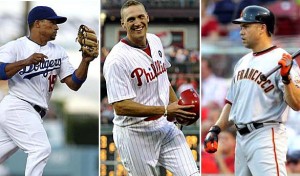
The Dodgers moved veteran shortstop Rafael Furcal (left) to the contending Cardinals while the Phillies acquired All-Star outfielder Hunter Pence (center) and the Giants added slugging outfielder Carlos Beltran to their lineup in the final days before the trade deadline. (Los Angeles Times/US Presswire/Getty Images)
The rich got richer (Philadelphia, San Francisco) and the Los Angeles Dodgers got poorer. For the first time in a while, Dodgers GM Ned Coletti was not a buyer, but a seller.
What was once a major stamp on major league baseball is bankrupt and out of playoff contention.
While the Phillies made moves for stars like Hunter Pence, the Dodgers resorted to menial deals, sending shortstop Rafael Furcal to the St. Louis Cardinals to save approximately $1.4 million in salary for prospects.
To make matters worse, Dodgers fans may have to witness the city by the bay up north hoisting a World Series Trophy while the Dodgers remain in limbo.
The Giants got Carlos Beltran from the New York Mets, Orlando Cabrera from the Cleveland Indians, and bolstered their infield more with the acquisition of Jeff Keppinger.
The Giants were buyers for a pennant race. The Dodgers: sellers and investors for a clouded and unclear future.
It might remain foggy and cold on the San Francisco peninsula, but the Giants envision another deep playoff run. The Dodgers envision a way to climb out of the cellar, battling San Diego for the embarrassingly contentious fifth place award.
But the Giants and Phillies have money, and not in the midst of serious financial instability. As the saying goes, the rich get richer and the poor get poorer.
But at least major league baseball stands for a microcosm of the U.S. economy: an elite few represent vast amounts of wealth (Giants, Phillies, Yankees), many are the middle of the pack (Rays, Braves, Diamondbacks, White Sox), and many live in poverty (Astros, Dodgers, Orioles).
The non-waiver trade deadline. Something that was non-existent for the Dodgers for a team that is, well, non-existent in terms of contenders.
As Marlon Brando famously said in the 1954 film On the Water Front, “I coulda been a contender.”
Bet Frank McCourt is muttering that over and over all the way to bankruptcy court.
